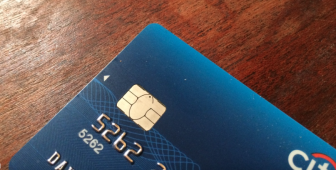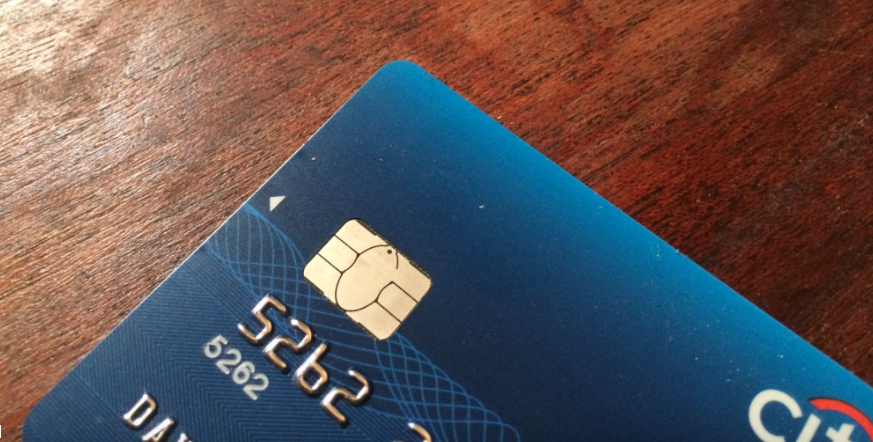Business owners who want to protect their stores’ bottom lines from some types of credit card fraud may need to get equipment that reads the “chip” credit cards now being introduced in the United States.
That was the message at a recent Darien Chamber of Commerce event from Mark Rosenbloom, the incoming chairman of the chamber’s Board of Directors and an assistant vice president at First County Bank. Rosenbloom is also manager of cash management services at the bank. First County is one of many sellers of the devices.

You can see the embedded microchip above the numbers on this credit card.
Legal liability in the United States shifts to the store if it doesn’t use the terminals built to read the embedded microchips in chip credit cards, Rosenbloom said at a “Business After Hours” event held Thursday at Jimmy’s Southside Tavern on Heights Road.
In fact, legal liability shifts to either the store that accepts a fraudulent credit card, or the bank that handles the transaction or the credit card company — whichever party isn’t using credit cards not embedded with the microchips, Rosenbloom said. That legal “liability shift” started last Oct. 15 and over the next few years, banks and credit card companies are issuing cards with the devices.
Some banks are moving faster than others in issuing them, he said. First County Bank is in the process right now, and many people already have one or more credit cards issued with chips.
One business owner at the meeting said her store has a chip-reading terminal, but “I’ve only had one customer so far” for whom a chip card was read.
“Everybody’s going to be getting chip cards,” Rosenbloom said. Not all ATMs can read the chips yet, but they will. It does take a bit longer for a transaction when using the chips, he said.
“The new standard of operation is called ‘EMV’ — developed by Europay, MasterCard and Visa to be a more secure way of paying,” Rosenbloom said in prepared comments. “A chip card is a standard-size plastic debit or credit card that contains an embedded microchip, as well as the traditional magnetic stripe.
“The chip protects in-store payments because it generates a unique, one-time code that is needed for each transaction to be approved,” he continued. “It is virtually impossible for fraudsters to replicate this feature in counterfeit cards […]”
The EMV operations in the United States are now using both the chip and a customer’s signature. In Europe, the chip and a PIN (personal identification number) is used, similar to debit cards in the U.S. The technology used in Europe “is expected here in the U.S. in the future,” Rosenbloom said.
The system has been in place in various countries for years, even decades.
Currently, banks and credit card companies are bearing 62 percent of the cost of fraud connected to identity theft and merchants bear about 38 percent, said Michael Crawford, first vice president for retail and loan operations with First County Bank, who also spoke a the event.
What to consider when buying terminals
Rosenbloom, whose bank sells the chip-reading terminals, offered advice on what to look for when buying the devices, which can cost a few hundred dollars apiece:
- Consider what you could be paying for credit card fraud. The chip-reading terminals could pay for themselves in a pretty short time.
- That price of $200 to $300 is a good one, he said (it’s what his bank charges). If you’re quoted a higher price, shop around. Depending on the volume of sales in your business, you may pay much less — even nothing.
- Beware of leasing a chip-reading terminal. Over the long run, you could be paying much more than necessary.
- The terminal you buy will need to be compliant with whatever system your bank uses. Buying a terminal from your bank is one way to guarantee compatibility.

